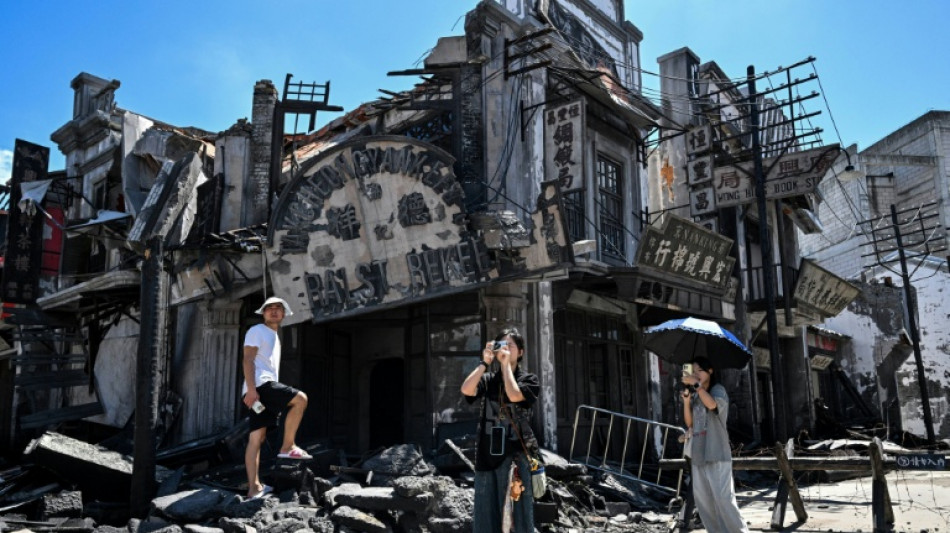
-
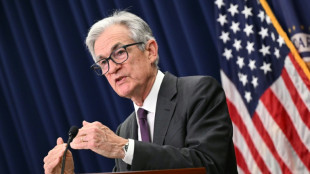 European stocks retreat before US inflation data
European stocks retreat before US inflation data
-
Howe vows Newcastle won't make 'poor' transfer decisions

-
 Max Verstappen: fan favourite but -- for once -- not race favourite
Max Verstappen: fan favourite but -- for once -- not race favourite
-
Austria orders YouTube to give users access to their data

-
 Labubu fans flock to stores after launch of mini dolls
Labubu fans flock to stores after launch of mini dolls
-
Italy's Meloni slams photo sharing in lewd sites scandal

-
 Swiss economic outlook 'dampened' by US tariffs: key barometer
Swiss economic outlook 'dampened' by US tariffs: key barometer
-
Tukuafu returns for women's rugby world champions New Zealand against Japan

-
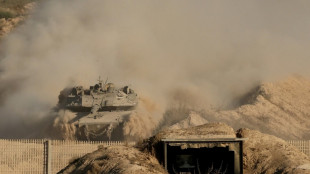 Israel army says Gaza City now 'a dangerous combat zone'
Israel army says Gaza City now 'a dangerous combat zone'
-
Trump son hypes bitcoin on Hong Kong leg of Asia trip

-
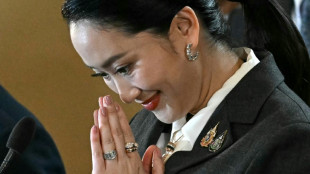 Paetongtarn Shinawatra: glamorous Thai PM felled by Cambodia row
Paetongtarn Shinawatra: glamorous Thai PM felled by Cambodia row
-
Park Chan-wook, master of black comedy, returns to Venice
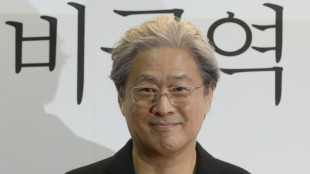
-
 Mourinho sacked by Fenerbahce after Champions League exit
Mourinho sacked by Fenerbahce after Champions League exit
-
German unemployment tops 3 million, highest for a decade

-
 Thai court sacks PM over Cambodia phone call row
Thai court sacks PM over Cambodia phone call row
-
Turkey says Russia scales back Ukraine territorial demands
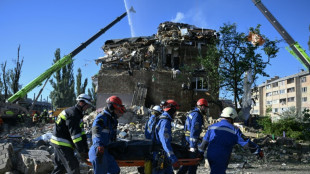
-
 South Korea's ex-first lady indicted for bribery
South Korea's ex-first lady indicted for bribery
-
Lay off our eggs market, French producers tell Ukraine

-
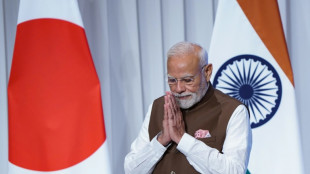 Modi says India, Japan to 'shape the Asian century'
Modi says India, Japan to 'shape the Asian century'
-
Hope and hate: how migrant influx has changed Germany
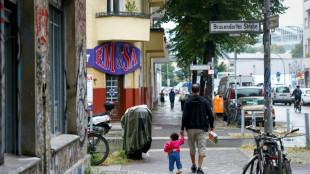
-
 Outdoor athletics season should be longer, says Coe
Outdoor athletics season should be longer, says Coe
-
Russian composer Rodion Shchedrin dies aged 92: Bolshoi

-
 Thai court to rule on PM's fate after Cambodia phone call row
Thai court to rule on PM's fate after Cambodia phone call row
-
Last French survivor of key WWII desert battle dies aged 103

-
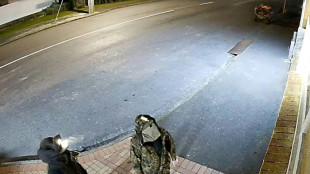 NZ police say CCTV shows father on the run for four years
NZ police say CCTV shows father on the run for four years
-
Vandalism hobbles Nigeria's mobile telephone services
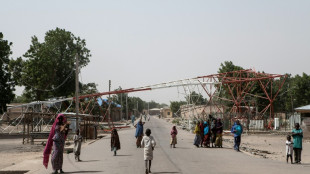
-
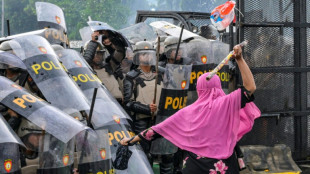 Indonesia leader orders investigation into driver's protest death
Indonesia leader orders investigation into driver's protest death
-
At 81, DJ Gloria fills Sweden's dancefloors
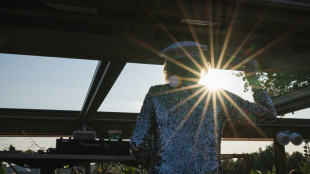
-
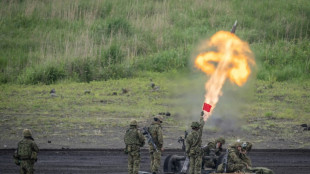 Japan seeks record defence budget, to triple drone spending
Japan seeks record defence budget, to triple drone spending
-
Late-night Paul battles through at US Open in 1:46 am finish

-
 Jury finds Australian croc wrangler lied about air crash
Jury finds Australian croc wrangler lied about air crash
-
Mistrust undermines Ivory Coast's universal healthcare dream

-
 Sinner on the march as Swiatek, tearful Gauff toil at US Open
Sinner on the march as Swiatek, tearful Gauff toil at US Open
-
Australian police urge gunman to surrender after officers killed
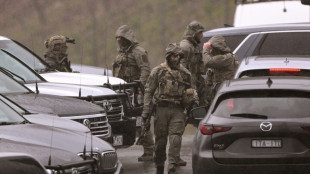
-
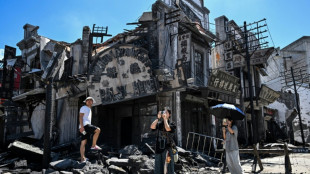 Nanjing massacre film set becomes China school holiday hotspot
Nanjing massacre film set becomes China school holiday hotspot
-
Celtic and Rangers seek Old Firm tonic for Champions League trauma

-
 Aussie Rules player latest found with concussion-linked brain disease
Aussie Rules player latest found with concussion-linked brain disease
-
Zelensky urges more Western pressure on Putin after deadly Russian attack

-
 US ends tariff exemption for small packages shipped globally
US ends tariff exemption for small packages shipped globally
-
Asia stocks mixed after Wall St hits new highs
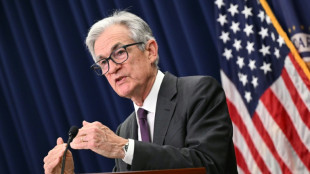
-
 Cash-strapped Taliban look to airspace for windfall
Cash-strapped Taliban look to airspace for windfall
-
Biles' presence helps Gauff win US Open crying game
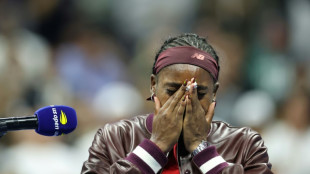
-
 'Female power': Japan erotic art destigmatised in new exhibit
'Female power': Japan erotic art destigmatised in new exhibit
-
Olympic marathon champion Hassan opts for Sydney ahead of worlds

-
 Atletico already playing catch-up after poor La Liga start
Atletico already playing catch-up after poor La Liga start
-
Lyon find cause for optimism after turbulent summer

-
 Sinner on the march as tearful Gauff, Swiatek toil at US Open
Sinner on the march as tearful Gauff, Swiatek toil at US Open
-
Julia Roberts to make Venice debut in cancel culture drama

-
 Big numbers set to remain a feature of Women's Rugby World Cup
Big numbers set to remain a feature of Women's Rugby World Cup
-
Families lose hope for Salvadorans held in gang crackdown
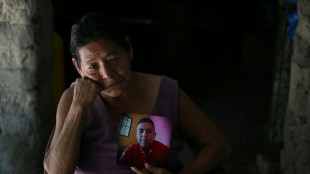

Nanjing massacre film set becomes China school holiday hotspot
The sound of machine gun fire rattled around collapsed buildings as schoolchildren eagerly explored the ravaged streets of 1930s Nanjing, delighted to be visiting the set of a Chinese blockbuster about a historic massacre.
Slickly produced and star-studded, "Dead to Rights" is set in Nanjing, then China's capital, during six weeks of mass murder, rape and looting by the Japanese army in 1937 that killed tens if not hundreds of thousands.
In keeping with other films about the slaughter, "Dead to Rights" does not shy away from portraying the atrocities, but that hasn't deterred viewers. It has topped the Chinese box office since late July.
Its set at a suburban Shanghai film park is now open to the public, and was thronged with enthusiastic fans -- many of them young children -- when AFP visited this week.
An enormous, bullet-ridden mural of China's former leader, Chiang Kai-shek, stared down from a bombed-out building as visitors poured in, taking selfies and livestreaming excitedly.
Beneath the levity, the film had provoked strong emotions.
"It's a deep pain that comes from within, a feeling of profound hatred," said a woman surnamed He, describing her feelings towards Japan.
"History is something that can't be erased in the heart, no matter what happens in the future."
One man told AFP he had travelled almost 2,000 kilometres from northern Ningxia with his five-year-old son, who had watched the film.
Another young boy holding a Chinese flag struck a triumphant pose on a charred mound of rubble and broken glass, as his parents snapped pictures of him against the blue summer sky.
- 'Stoking fires'? -
The film's plot revolves around a group of Nanjing residents hiding in a photo studio, who are forced to develop Japanese photograph "souvenirs" of war crimes.
A South China Morning Post review called the movie "thunderously powerful" but said some violent scenes were "as though engineered to stoke the fires of anti-Japanese sentiment".
"Dead to Rights" is one of several summer releases about the war with Japan, which killed millions of Chinese, and which many feel Tokyo has never properly atoned for.
The country is gearing up for a major military parade next week to mark 80 years since Japan's defeat and World War II's end.
The "Dead to Rights" poster reads: "No Chinese person will ever forget."
"I don't think (films like this) represent hatred. It's because we need to restore history," said 37-year-old visitor Jiang Xiang.
The death toll of the massacre -- the Chinese put it at 300,000 -- remains a source of debate, and some Japanese arch-conservatives have denied it took place at all, despite overwhelming international evidence.
Jiang said awareness of China's suffering should be passed down the generations -- to teach that "we need to rely on ourselves, keep growing stronger".
- 'Understand history' -
In the on-set photo studio, a visitor's book was completely full of comments both patriotic and profane.
"Japan is the stupidest country in the world," read one in a childish scrawl.
Almost all of the parents AFP met said their children had watched the movie, with one mother from Nanjing saying their school had encouraged it.
China has no film rating system, and it is not uncommon for children to watch content that might be considered overly violent elsewhere.
"Look, that's where the head was hanging (in the film)!" a child giggled to a friend as they passed a wooden post.
Tourist He said war films "teach children how our ancestors fought for us".
The aim was to help "the children understand history -- not to make them hate or anything".
Middleschooler Li Xinyi said she found the Japanese "dislikeable" but cautioned against bitterness.
"Even though they did many cruel things to us, we still need to respect them, because now we must focus on peace."
H.Darwish--SF-PST
